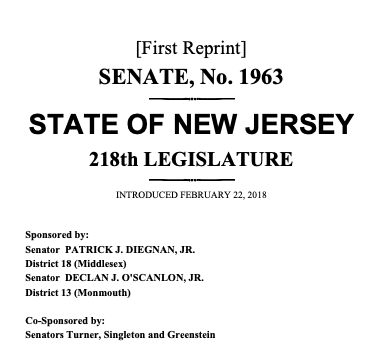The New Jersey Assembly unanimously passed a bill late Monday that would shine a light on “civil forfeiture,” which lets law enforcement seize property without ever charging the owner with a crime. In New Jersey, once property is forfeited, the government can then keep up to 100% of the proceeds, creating a perverse incentive to confiscate cash, cars and other valuables.
Under the bill (S1963), county prosecutors would submit quarterly reports that detail an agency’s seizure and forfeiture activity, including if they filed any criminal charges when seizing property. S1963 would also require law enforcement to report the date, description and location of the seizure, the agency involved, if the property was claimed by anyone, and its final disposition.
Once submitted, a report summary would be made publicly available on an online, searchable database created by the Attorney General. Departments that fail to comply would be required to disgorge any property seized or forfeited during their period of noncompliance, while the property would be returned to their owner. Finally, the bill would codify longstanding state policy on tracking forfeiture spending. According to the Institute for Justice (IJ),county district attorneys collected more than $72.5 million in forfeiture revenue between 2009 and 2013.
“By itself, improved transparency cannot fix the fundamental problems with civil forfeiture—namely, the property rights abuses it permits and the temptation it creates to police for profit,” noted Jennifer McDonald, an IJ senior research analyst who testified in favor of the bill and co-authored a report on forfeiture transparency. “Through its comprehensive disclosure requirements, this reform would play a vital role in keeping both the public and legislators well-informed about civil forfeiture in the Garden State.”
Should Gov. Phil Murphy sign the bill, New Jersey would become the 34th state to enact forfeiture reform. It would also be the 24th state to specifically pass new transparency requirements for civil forfeiture and would have the most robust reporting law east of the Mississippi.
The importance of collecting data is further underscored by a recent study from the Institute for Justice, which indicates that forfeiture doesn’t help police fight crime, but rather is a source of revenue for law enforcement. The IJ report, “Fighting Crime or Raising Revenue? Testing Opposing Views of Forfeiture,” combines local crime, drug use and economic data from a variety of federal sources with more than a decade’s worth of data from the Department of Justice’s equitable sharing program, which has funneled billions of dollars in forfeiture funding to state and local law enforcement.
The study specifically found that when local economies suffer, forfeiture activity increases, suggesting police make greater use of forfeiture when local budgets are tight. A 1 percentage point increase in local unemployment—a standard proxy for fiscal stress—is associated with a statistically significant 9 percentage point increase in seizures of property for forfeiture.
“This study shows New Jersey policymakers can undertake serious and much-needed forfeiture reforms without jeopardizing police effectiveness,” said Lee McGrath, senior legislative counsel at the Institute for Justice. “The state’s forfeiture laws have long encouraged the pursuit of profit over public safety. In the next session, we urge the New Jersey Legislature to end civil forfeiture and replace it with criminal forfeiture. The legislature should also end forfeiture’s perverse financial incentives and direct forfeiture proceeds to neutral accounts.”
































